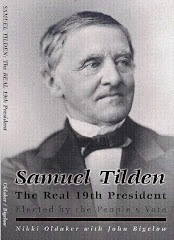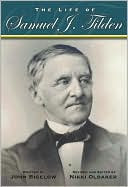RECOMMENDATION OF S. J. TILDEN FOR THE OFFICE OF ATTORNEY FOR THE CITY AND COUNTY OF NEW YORK
"To the Democratic Members of the Com. Council:*
"The undersigned, members of the Bar, recommend Samuel J. Tilden' for appointment as Attorney to the Corporation. Mr. Tilden's services and qualifications are such that in our opinion his appointment would give the highest satisfaction to the Democratic party, the legal profession, and the public generally.
"New York, April, 1843. " I sign the above most cheerfully: Lewis H. Sandford, William S. Sears, John E. Livingston, Jr., D. D. Field, C. V. S. Kane, Chs. G. Havens,Chas. B. Moore, James J. Roosevelt,L. Robinson, C. Mclean, Samuel A. Crapo, Theodore Sedgwick,Hawks & Scoville.
"I cheerfully concur in the foregoing recommendation: Thos. R. Lee, Lathrop S. Eddy,
P. Reynolds, Wm. McMuRRAY."
* The place of attorney for the City and County of New York for which this address to the Democratic members of the Common Council, was the only office Mr. Tilden ever held by appointment. He held it but about one year, during which time he docketed 123judgments for violations of city ordinances.
The nomination, election, and inauguration of Senator Wright as Governor of New York State, in 1844, gave Mr. Tilden a greater influence perhaps than was possessed by any other individual in the dispensation of the patronage of the Executive at this time. His friend, John W. Edmonds, in whose office he had studied his profession, a native of the same county as himself, and a lawyer of considerable ability, was anxious for the appointment of Surrogate of New York city. Though he failed in this effort, he subsequently was appointed one of the Justices of the Supreme Court, largely, not to say entirely, through Mr. Tilden's influence.
By the spring elections of 1844 both the old parties were thrown into confusion and driven from the field by the "Native American" party, so called, which appeared with a suddenness and force of a tropical cyclone and swept the country.
The friends of Mr. Van Buren in New York naturally looked to Mr. Van Buren as their candidate for a renomination to the Presidency. He was defeated, however, in the national convention, and James K. Polk, of Tennessee, received the nomination. The following letter from Mr. Tilden to his brother is the only account we have from his pen of his experiences in that convention to which he was a delegate. Unhappily, the manuscript is incomplete.
S. J. TILDEN TO HIS BROTHER
"Baltimore, May 27, 1844-
"My Dear Brother,—Here we are in a state of extraordinary excitement and great uncertainty. There is a deep and almost universal disaffection in the South. Virginia is against us by a large majority, also North Carolina, Ga., Miss., Ark., La., probably Maryland, Indiana; New Jersey, Michigan, Alabama, 111., Conn, doubtful; N. Y., Missouri, Ohio, N. H., Vermont, R. I. reliable; Penn. instructed and ready to vote with us on the.main question, but liable, some of them, to cheat on collaterals.
"We have a small fixed majority certain on the first ballotings, but some of the Penn. delegates and probably some others may be and probably will be inclined very soon to desert. But the plan of the disaffected is to require a two-third vote to make a nomination. This, they think, and probably with correctness, that Mr. V. B. cannot get, and then they may bargain with those who vote with us but are not hearty in our cause. Some of the Penn. men who are instructed and are therefore obliged to vote for V. B. would prefer Buchanan — have been approached by propositions from the South to bargain with them, with what effect we cannot know."
SILAS WEIGHT TO S. J. TILDEN
"Washington, May 10, 1844. " Private.
"My Dear Sir,—Your letter came safely, but you will have conjectured, from the public appearance of things here, that some of us have been rather busy for some days past. I have but a single moment now to say that if you shall have occasion to send papers here for distribution, Mr. Stevenson will do the labor, so far as you shall direct addresses, and we will see that others are obtained here, but we cannot send you franks.
"I have only completed the speech today, and it certainly is not better for having been written out amidst the unexampled excitement of the last two weeks. A part of it will appear to-morrow, and the residue on Monday evening, and I will take a pamphlet copy, when I get one, and mark it off as you suggest, by proper heads to the divisions.
"Please inform me, as soon as you receive this, if Mr. Butler has returned. I want to communicate to him on the subject of the convention as soon as he reaches, if he is not yet home.
"A letter from Cambreling received to-day tells me that he is off for Carolina only to return to the Convention. He ought to be at hand to meet the delegates in New York when they should have a meeting.
"In very great haste,
" I am, truly yours,
" Silas Weight.
"Samuel J. Tilden, Esq."
The triumph of the Native American party and the election of Mr. Harper for Mayor led to a general and prompt change of all movable officers of the municipal administration. Mr. Tilden tried to anticipate the party proscription, but by some mistake, the nature of which is illegible in the following letter, he had to undergo the proscription of the victors, which, however, neither politically nor financially involved any personal sacrifice.
SAMUEL J. TILDEN TO R. L. SHIEFFELEN, ESQ., PRESIDENT OF THE COMMON COUNCIL"New York, May 25, 1844. " To the Honorable the Common Council of the City of
New York:
"I have expected at each of your meetings to be removed, but have been disappointed. In case my successor as Attorney to the Corporation shall not be selected this evening, I respectfully present to you my resignation, to take effect on the day after your next joint meeting, until which time the public interests entrusted to my care shall not be embarrassed.
"I am, respectfully, your, &c.,
"Samuel J. Tilden."
Comparatively recent note in pencil in Mr. Tilden's handwriting:
"In the haste of preparing to leave the city for the Baltimore Convention this wish was omitted, and while I was there I was removed."
Senator Wright yielded very reluctantly to the irresistible pressure of both divisions of his party that he should accept the nomination tendered him for Governor at the fall election of 1844. It was apparent to the friends of Mr. Polk that he could not carry the State of New York without the support of the friends of Mr. Van Buren and Wright, and no less of a sacrifice than the transfer of Mr. Wright from the Senate to the Governorship could make the State reasonably secure for the Presidential ticket. How reluctantly Mr. Wright yielded to this pressure is not
to be measured solely b,y his far-sighted doubt of its policy and of the advantages of a victory for the Slavery-Extension party at that time. He had other reasons of a domestic nature presented some three years before in a most pathetic and touching letter addressed to Mr. Tilden's father.*
The logic of the situation presented by Mr. Wright's nomination for Governor in 1844 required that he should by his election save the Presidential ticket and then " succeed President Polk in 1848 or retire from public life," and Mr. Marcy to defeat Mr. Wright's re-election as Governor, or himself retire from public life. It was practically to engage in such a duel that Mr. Wright went to Albany and took the oath of office on the 1st of January, 1845. He had in his favor a great parliamentary reputation, and a character for wisdom, probity, and political sagacity, enjoyed in a superior degree by no other American statesman of his generation.
On the other hand, he had to contend with an administration in whose eyes all these virtues, when enlisted against slavery, were regarded only as so many additional reasons for crushing their possessor. He had also to contend with a very considerable number who still called themselves Democrats, but who had deserted the party from mistrust of the success of its financial policy, and who were impatient to recover some sort of party standing.
Mr. Tilden engaged in this canvass for President Polk with more zeal than in any other except, perhaps, the last, in which he was himself a candidate, and in both instances was betrayed by his party.
Not the least efficient of his services in this campaign was the establishment of the Daily News in connection with John L. O'Sullivan.
O'sullivan's Plan And Estimate In Regard To The "Morning News."
TO BE CONTINUED IN TOMORROWS BLOG....HOPE YOU ALL ARE ENJOYING THIS RICH HISTORY
Friday, June 05, 2009
RECOMMENDATION OF S. J. TILDEN FOR OFFICE OF ATTORNEY FOR THE CITY AND COUNTY OF NEW YORK --NATIVE AMERICAN PARTY WINS! POLK NOMINATED OVER VANBUREN!
Subscribe to:
Post Comments (Atom)



No comments:
Post a Comment
Post your comments: